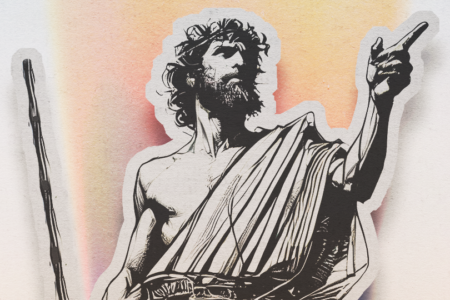The Death of John the Baptist
John’s life and death call us to faithfulness in the darkness.
The wine flowed freely throughout the lavish banquet hall. The occasion was the pagan birthday celebration of Herod Antipas, tetrarch of Galilee. The noise of the music and the howls of hilarity would have been heard throughout the palace and deep within its dungeon, where sat the prisoner and prophet John the Baptist.
When the party’s merriment had reached its height, Antipas decided to stimulate the lustful excitement of his drunken guests by asking the young daughter of his evil wife Herodias, to whom he was unlawfully wed, to perform an erotic dance. Pleased with the girl’s lewd performance, the drunken king told her, “Ask me whatever you want, and I will give it to you, . . . up to half my kingdom” (Mk. 6:22–23).
Scripture says the girl “went out and said to her mother, ‘What shall I ask?’” And Herodias replied, “The head of John the Baptist!” (v. 24).
So, Herod had John executed and his head brought on a platter to the girl, who gave it to her mother (vv. 26–28). The incident was tragic. Yet, it serves as an example of faithfulness in darkness. As King David sang in the days of his troubles, “For You will light my lamp; the Lᴏʀᴅ my God will enlighten my darkness” (Ps. 18:28).
The life and death of John the Baptist exhibit three basic truths for those of us who follow Jesus:
→ We will always stand apart from the ways and culture of the world if we live righteously.
→ We must always be faithful to proclaim truth to a sinful world.
→ We will always be persecuted for following Christ.
Live a Righteous life
John devoted his life to Jesus Christ and His Kingdom. However, living for the Lord comes with a price. As Jesus told His disciples, “If anyone desires to come after Me, let him deny himself, and take up his cross, and follow Me. For whoever desires to save his life will lose it, but whoever loses his life for My sake will find it” (Mt. 16:24–25).
Herod Antipas knew John was righteous. He knew him to be holy, and he talked with him and listened to him gladly (Mk. 6:20). Throughout his ministry, John preached about holy and righteous living: “In those days John the Baptist came preaching in the wilderness of Judea, and saying, ‘Repent, for the kingdom of heaven is at hand!’” (Mt. 3:1–2).
When people asked him what to do, He replied, “He who has two tunics, let him give to him who has none; and he who has food, let him do likewise” (Lk. 3:11).
When corrupt tax collectors came to be baptized and asked him what to do, he told them, “Collect no more than what is appointed for you” (v. 13).
When soldiers asked him, he said, “Do not intimidate anyone or accuse falsely, and be content with your wages” (v. 14).
Righteous living involves putting others first. Yet, throughout the world, Christians are treated viciously for living for Christ. As Jesus told us,
If the world hates you, you know that it hated Me before it hated you. These things I have spoken to you, that in Me you may have peace. In the world you will have tribulation; but be of good cheer, I have overcome the world (Jn. 15:18; 16:33).
Boldly Proclaim the Gospel
John was filled with faith and fury, and he boldly proclaimed God’s Word. He challenged the religious leaders who came to him because they had no intention of repenting:
Then he said to the multitudes that came out to be baptized by him, “Brood of vipers! Who warned you to flee from the wrath to come? Therefore bear fruits worthy of repentance, and do not begin to say to yourselves, ‘We have Abraham as our father.’ For I say to you that God is able to raise up children to Abraham from these stones. And even now the ax is laid to the root of the trees. Therefore every tree which does not bear good fruit is cut down and thrown into the fire” (Lk. 3:7–9).
Like John, believers are to declare the truth, rebuke evil, and suffer patiently regardless of the consequences. Our commitment is to the Lord, not to the world. The world will always hate those who rebuke ungodliness and unrighteousness. Jesus said, “If you were of the world, the world would love its own. Yet because you are not of the world, but I chose you out of the world, therefore the world hates you” (Jn. 15:19).
John the Baptist’s faith made him unafraid to “give knowledge of salvation to His people by the remission of their sins” (Lk. 1:77). He fearlessly proclaimed the Good News: “Behold! The Lamb of God who takes away the sin of the world!” (Jn. 1:29).
The Lord calls us to “preach the word! Be ready in season and out of season. Convince, rebuke, exhort, with all longsuffering and teaching” (2 Tim. 4:2).
Expect Persecution
We stand on the shoulders of the many martyred followers of Christ throughout history. For millennia, Christians have been called to suffer for their faith. “There is no university for a Christian, like that of sorrow and trial,” said the great 19th-century preacher, Charles Haddon Spurgeon.1
Foxe’s Book of Martyrs, first published in 1563, records many vicious persecutions during the earlier Church Age. Christians suffered cruel tortures and appalling deaths. Some were eaten by ferocious animals; many others were beaten, whipped, and even beheaded.
When Polycarp, reportedly a disciple of the apostle John, was urged to renounce Christianity, he declared, “Eighty and six years have I served Him, and He never once wronged me: how then shall I blaspheme my king who hath saved me?”2 He was then burned to death.
The apostle John, though not martyred, is said to have been boiled in oil. He then was banished to the Greek isle of Patmos. There he received revelation from Christ and wrote the book of Revelation.
To the persecuted church at Smyrna, God promised the crown of life:
Do not fear any of those things which you are about to suffer. Indeed, the devil is about to throw some of you into prison, that you may be tested, and you will have tribulation ten days. Be faithful until death, and I will give you the crown of life (Rev. 2:10).
The book of James also mentions the crown of life:
Blessed is the man who endures temptation [affliction, persecution, death]; for when he has been approved, he will receive the crown of life which the Lord has promised to those who love Him (1:12).
Christians today are no strangers to persecution. More Christians were martyred for their faith in the 20th century than in all the previous centuries combined.3 In Nigeria, more than 52,000 Christians “have been butchered or hacked to death for being Christians” since 2009, according to Intersociety, a civil society group based in Onitsha, Nigeria.4
And opendoorsus.org reports, “On average, more than 13 Christians are killed each day for their faith. That means almost every two hours, a believer is killed. And it’s roughly 5,000 people each year.” Scripture is clear: “All who desire to live godly in Christ Jesus will suffer persecution” (2 Tim. 3:12).
Beloved, do not think it strange concerning the fiery trial which is to try you, as though some strange thing happened to you; but rejoice to the extent that you partake of Christ’s sufferings, that when His glory is revealed, you may also be glad with exceeding joy (1 Pet. 4:12–13).
Like John the Baptist, we must know what we believe and why we believe it so that we can stand firm when our faith is tested.
ENDNOTES
-
-
- Charles Spurgeon, AZQuotes (azquotes.com/quote/585391).
- John Foxe, Foxe’s Book of Martyrs, ed. William Byron Forbush (Peabody, MA: Hendrickson, 2004), 14.
- Dan Wooding, “Modern Persecution,” April 28, 2010 (tinyurl.com/martyrs-1).
- Mitch Kokai, “World Ignores Killing of Christians in Nigeria,” John Locke Foundation, January 2, 2024 (johnlocke.org/world-ignores-killing-of-christians-in-nigeria).
Photo: Adobe Stock
-








